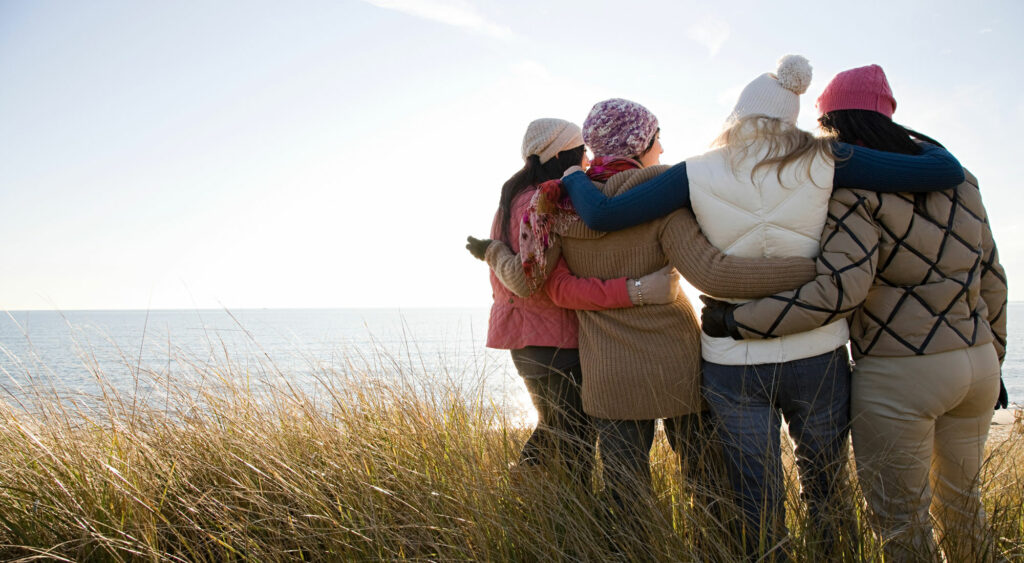By The Meadows Ranch
Are you having trouble making friends? Lose weight! Can’t move up the career ladder? Shed some pounds! Need a new relationship? Drop a dress size! For decades, women’s bodies have been scrutinized and weight loss touted as the answer to life’s problems. Equally troubling though, is the detrimental effects of this mindset on a woman’s mental and emotional well-being.
And yet, it seems counterintuitive to go against diet culture because it has become the norm. Nevertheless, just because something “has always been” does not mean it should continue that way. With progress comes change, and it’s important to question long-held practices and beliefs.
In this case, is diet culture actually serving women today, or is it causing more damage than good? Challenging diet culture is necessary if we desire, individually as well as collectively, to achieve the goal of empowering women toward greater self-love and acceptance.
The Influence of Diet Culture on Women
Among the most prevalent cultural messages today is that women need to change their bodies to be loved, accepted, and accomplished. This idea is reinforced by media platforms, including social media, movies, television, and commercials. In fact, these outlets often communicate that weight loss is not only desirable but necessary.
 There are numerous factors that contribute to diet culture and its influence on women around the world. In the United States alone, the diet and weight-loss market is a multibillion-dollar industry. According to Yahoo Finance Custom Market Insights, its estimated worth in 2022 was about $135.7 billion a year with projections to reach about $305.3 billion by 2030. Here are some major contributors to the weight-loss market and diet culture trends:
There are numerous factors that contribute to diet culture and its influence on women around the world. In the United States alone, the diet and weight-loss market is a multibillion-dollar industry. According to Yahoo Finance Custom Market Insights, its estimated worth in 2022 was about $135.7 billion a year with projections to reach about $305.3 billion by 2030. Here are some major contributors to the weight-loss market and diet culture trends:
- Medical weight-loss clinics and franchises
- Commercial weight-loss programs
- Online diet programs
- Frozen diet entrees
- Meal replacement products (shakes, bars, etc.)
- Supplements and weight-loss products
- Advertisements
Diet culture is rampant; however, the high failure rate of diets and weight-loss products, along with skyrocketing market profits show that one thing is true: Diets don’t work, and weight loss is not the answer.
Why We Need to Challenge Diet Culture
Diet culture would have women believe that their self-worth is tied to their appearance. When we examine how this mentality impacts women, it’s clearly destructive. Dieting is associated with the following behaviors and side effects, including:
- Increased risk of mental illness, including mood and anxiety disorders
- Increased risk of disordered eating that could lead to an eating disorder
- Increased obsession with food and chaotic eating
- Increased risk of morbidity and mortality associated with loss of muscle mass, increased cortisol levels, and weight cycling
- Decrease in overall metabolic weight
By challenging diet culture, women can find the freedom to live in and care for their bodies confidently.
These adverse reactions are rarely disclosed in any weight-loss program or on any product. The weight-loss industry promotes, and even promises, a healthier, happier life. This problematic rhetoric keeps women in a vicious dieting cycle, spending money on potentially harmful programs and products.
Lasting health and happiness are rooted in a healthy body image, body positivity, and acceptance of our perceived flaws or weaknesses. Wellness is a lifestyle fueled by things like proper nourishment, positive body movement, healthy relationships, and personal boundaries. By challenging diet culture, women can find the freedom to live in and care for their bodies confidently.
Body Diversity and Redefining Beauty
When challenging diet culture, we need to ask why so many of us are uncomfortable in our own skin? How have we arrived at today’s impossible beauty standards? As previously mentioned, media plays a significant role in influencing our ideas about beauty.
Media showcases certain body sizes and features, suggesting they are more beautiful or desirable than others, explains an abstract from The Oxford Handbook of the Psychology of Appearance. These “ideals” typically mimic traditional Western beauty preferences, such as “a thin body shape for women, a lean and muscular body shape for men, facial symmetry, and a clear and youthful complexion.”
Ironically, only a fragment of men and women who exhibit these traits actually exist in the general population. Regardless, media dictates what is and isn’t beautiful. But what if we controlled the beauty narrative? Could we change the trajectory of diet culture? A good place to start is by promoting body diversity. Body diversity acknowledges the various shapes, sizes, and types of bodies we have and understands that no single form is better than another.
And the message of body diversity is clear: Weight does not equal worth. This is crucial to help women break free from the overwhelming pressure that comes from feeling like their bodies are not “good enough.” Some simple ways to practice body diversity include focusing on wellness beyond weight, challenging body stigma, and celebrating the differences in body types that make us unique.
Another way we can oppose diet culture is by advocating for redefined beauty standards. This might look like supporting inclusive clothing brands, speaking out against digitally altered images online, or boycotting companies that misrepresent women in the media.
We can change public rhetoric around beauty and weight loss, but the positive message must start from within.
Weight loss is not the answer. Issues of self-worth run deeper than a number on a scale.
Embracing A Healthy Body Image
No one should waste their life worrying about food and weight. And the good news is, you don’t have to. You can take mental and physical steps toward embracing a healthy body image and lifestyle. Consider the following suggestions as you better understand your body image:
- Make a list of your positive attributes, skills, and talents to help you appreciate your whole self.
- Focus on valuing and respecting what your body can do.
- Set health-focused goals centered around a non-diet approach, like increasing positive body movement or embracing intuitive eating.
- Avoid comparing yourself to others; instead, recognize what makes you special.
- Remember that many media images are unrealistic and represent a very small minority of the population.
- Understand that weight loss is not the answer. Issues of self-worth run deeper than a number on a scale. Rejecting weight loss and seeking professional help to address the root cause of your struggle is the most effective treatment.
The Meadows Ranch Can Help
If you struggle with mental health and body image or if chronic dieting has led to damaging eating disorder behaviors, please know you are not alone. Our team at The Meadows Ranch offers specialized care and a compassionate approach to help guide you toward healing, freedom, and a true sense of health.
We believe in holistic treatment, caring for your physical, mental, and emotional well-being. And we don’t just address eating disorders, we get to the root cause, making lasting recovery possible.
Connect with us today to learn more about how we can help you reclaim your life.

